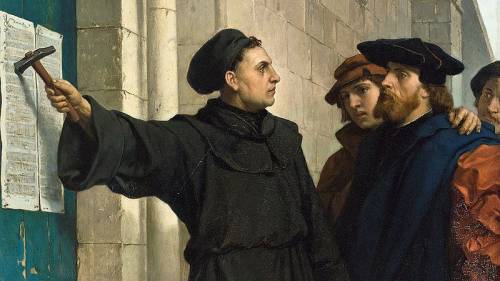Indulgent practices
Have we inadvertently resurrected an old tradition?
By Mark Roth

Ferdinand Willem Pauwels’ 1872 painting of Luther posting his 95 Theses. Courtesy of Wikimedia Commons.
As I began to write this entry, we had just celebrated Reformation Sunday, which commemorates Martin Luther’s posting of his 95 theses in Wittenberg, Germany, in October 1517.
So, confession time. I grew up Lutheran, but had never read through the theses, despite all the memorization of the Small Catechism we did during confirmation class.
As it turns out, they are devoted almost entirely to a practice that infuriated Luther – the Catholic Church’s sale of indulgences, in which people would pay money to get their dead relatives out of the airport waiting room of Purgatory and on a flight to Heaven.
As I read through the 95 statements, it was apparent that Luther was often walking a political tightrope between praising the pope and criticizing this practice, which was being used to raise money for construction of St. Peter’s Basilica in Rome. But try as he might, Luther could not tone down his language.
Thesis 50 says, for instance, “Christians are to be taught that if the pope knew the exactions of the indulgence preachers, he would rather that the basilica of St. Peter were burned to ashes than built up with the skin, flesh, and bones of his sheep.”
What seemed to bother Luther most was not just the theology behind indulgences, but the way priests who sold them were abusing the poor.
“Christians are to be taught,” Luther wrote, “that unless they have more than they need, they must reserve enough for their family needs and by no means squander it on indulgences,” and “Christians are to be taught that he who sees a needy man and passes him by, yet gives his money for indulgences, does not buy papal indulgences but God’s wrath.”
We often have trouble understanding the passion people felt over theological disputes of earlier eras, whether it’s Luther’s attack on indulgences or Paul’s views on early Christians eating food that had been sacrificed to idols.
But with a little uncomfortable imagination, we might make the arguments relevant.
What if we posed the issues of Thesis 45 this way?
“Christians are to be taught that whoever sees a needy person and passes by, yet gives his money to repair the church organ …” or “whoever sees a needy person and passes by, yet cuts her pastor’s salary so she can eke out two more years of worship with the same 25 people she has known for decades …”
I say this as someone who loves organ music and who appreciates the deep sense of family that a small congregation creates. But Luther is talking about priorities here, not a zero-sum proposition.
If a church maintains its building so that it can offer a food pantry and a place for community groups to meet, that is an act of serving those in need. If it maintains its building so that a small group of people who already know each other can nestle in the pillow of comfortable rituals, it may in fact be walking past the needy.
It is clear that Luther thought we Christians were called not to comfort, but to struggle.
His final two theses put it this way: “Christians should be exhorted to be diligent in following Christ, their Head, through penalties, death and hell, and thus be confident of entering into heaven through many tribulations rather than through the false security of peace.”
 Mark Roth is a retired journalist and freelancer who specializes in writing about health and science issues. He is a Ruling Elder based at East Liberty Presbyterian Church in Pittsburgh, and is vice-chair of Pittsburgh Presbytery’s Commission on Ministry. He serves as an Adaptive Change Adviser for Pittsburgh Presbytery’s Unglued Church Project.
Mark Roth is a retired journalist and freelancer who specializes in writing about health and science issues. He is a Ruling Elder based at East Liberty Presbyterian Church in Pittsburgh, and is vice-chair of Pittsburgh Presbytery’s Commission on Ministry. He serves as an Adaptive Change Adviser for Pittsburgh Presbytery’s Unglued Church Project.